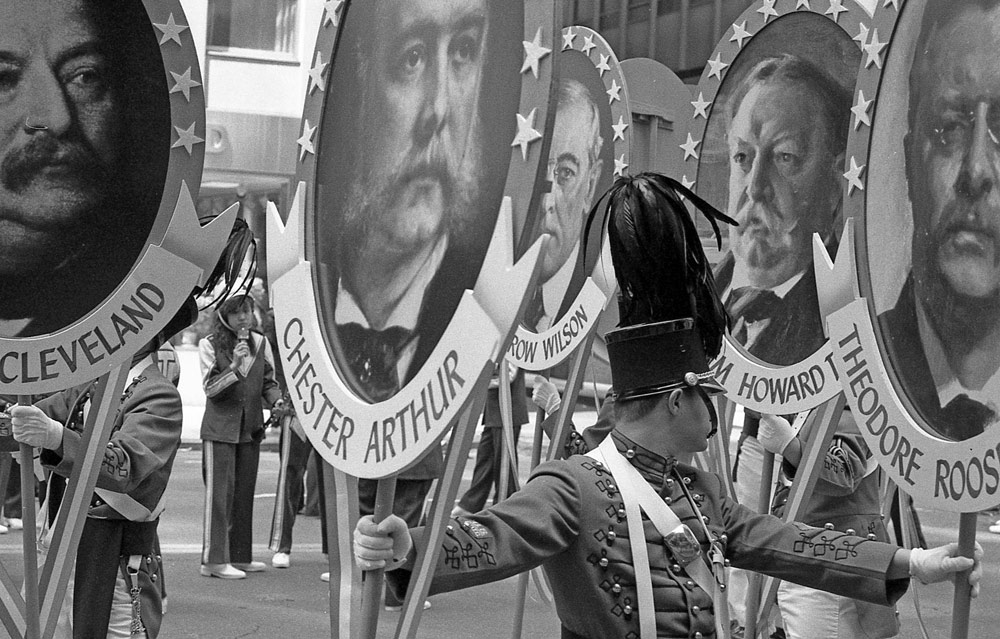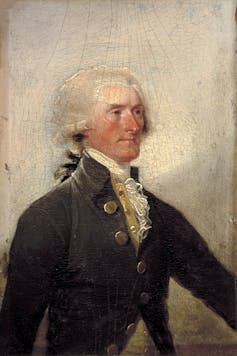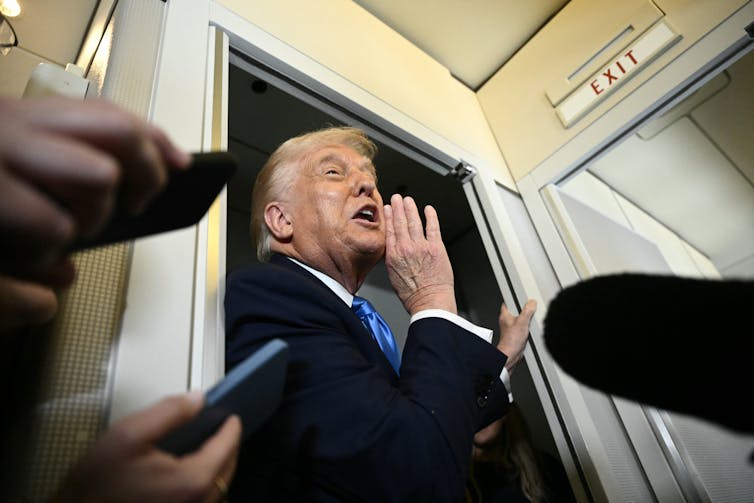
By Mark Satta
Only one person, Franklin Delano Roosevelt, has ever served more than two terms as president of the United States. This is for two reasons.
First, prior to Roosevelt’s election to a third term in 1940 there was a longstanding American tradition that presidents not serve more than two terms.
This tradition was established by the decisions of early presidents such as George Washington, Thomas Jefferson and James Madison not to seek a third term. This tradition was later adopted by other presidents.
Second, after Roosevelt died in office in 1945 during his fourth term, Congress and the people of the United States decided to turn the long-standing tradition that presidents should not serve more than two terms into a part of constitutional law.
This was done through the passage and ratification of the 22nd Amendment, which became part of the U.S. Constitution in 1951.

AP photo
Intent is clear
The key provision of the 22nd Amendment reads as follows: “No person shall be elected to the office of the President more than twice, and no person who has held the office of President, or acted as President, for more than two years of a term to which some other person was elected President shall be elected to the office of the President more than once.”
The intent is clear. No one is supposed to serve more than two full terms as president.
The only way someone can serve more than two terms is if they served less than two years in a previous term in which they weren’t elected president.
Here’s an example: If a vice president becomes president during the final year of a term because the president died, that vice president could still run for two terms. But that exception is still meant to bar anyone from serving more than a total of 10 years as president.
It is worth understanding why the two-term tradition was considered so important that it was turned into constitutional law the first time it was violated.
Starting the tradition
Commentators often cite George Washington’s decision not to seek a third term as president as establishing the two-term tradition. Political scientist and term limit scholar Michael Korzi gives a lot more credit to the nation’s third president, Thomas Jefferson.
Jefferson was outspoken in favor of the two-term tradition. As Korzi notes, this was, in part, because “Jefferson saw little distinction between a long-serving executive in an elective position and a hereditary monarch.” In other words, a president without term limits is too much like a king.

John Trumbull/GraphicaArtis, Getty Images
Jefferson saw a president who was willing to break the two-term tradition as power hungry, and he hoped that the American people would not elect such a president. This led him to write in his autobiography in 1821 that “should a President consent to be a candidate for a 3d. election, I trust he would be rejected on this demonstration of ambitious views.”
Jefferson also worried that without term limits, presidents would stay in office too long into their old age and after they had lost their ability to govern effectively. This led him to write that without term limits, there was a danger that “the indulgence and attachments of the people will keep a man in the chair after he becomes a dotard.”
Subsequently, presidents tended to abide by the two-term tradition. And in the few cases where presidents decided to seek a third term, their own parties would not give them the nomination.
That remained true until Roosevelt ran for, and won, both a third and a fourth term as president during World War II.
The 22nd Amendment
Roosevelt’s violation of the two-term tradition prompted Congress and the states to turn the tradition into a formal matter of constitutional law.
A major concern motivating the amendment was the same one that motivated Jefferson: to prevent a president from becoming a king. Multiple members of Congress identified the same concern during congressional sessions in the 1940s.
Sen. Chapman Revercomb from West Virginia stated that power given to a president without term limits “would be a definite step in the direction of autocracy, regardless of the name given the office, whether it be president, king, dictator, emperor, or whatever title the office may carry.”
Similarly, Rep. Edward McCowen from Ohio said that the 22nd Amendment would be “a great step toward preventing a dictatorship or some totalitarian form of government from arising.”
And Rep. John Jennings Jr. from Tennessee stated that only by adoption of the 22nd Amendment “can the people be assured that we shall never have a dictator in this land.”
Congress passed the 22nd Amendment on March 21, 1947. It took less than four years for the necessary three-fourths of the states to ratify the amendment, which became law on Feb. 27, 1951.

Brendan Smialowski/AFP via Getty Images
Tyrants and term limit violations
In the 1980s, political scientist Juan Linz identified that presidential systems are less stable than other forms of democracy, such as parliamentary systems. The difference seems to be that presidential systems concentrate more power in the hands of a single person, the president. This makes it easier to remove the checks and balances that democracies depend on.
As scholars have noted, violation of presidential term limits and other methods of increasing executive power are a common form of democratic backsliding – state-led debilitation or elimination of the political institutions that sustain a democracy.
Law professor Mila Versteeg and her colleagues have shown that in recent years presidents around the globe have used various tactics to try to violate presidential term limits. These tactics include trying to amend their country’s constitution, trying to get the courts to reinterpret the constitution, finding a replacement leader who the former president can control once out of office and attempting to delay elections.
They note that most of the time when a president’s attempt to violate term limits fails it is “because the attempt encountered widespread popular resistance.” They conclude that this finding implies that “broad resistance movements” may be the best means to prevent violation of presidential term limits.
![]()
Mark Satta is Associate Professor of Philosophy and Law at Wayne State University.





























Gary Kunnad says
Obama pulled a third term acting out biden’s term . All that crap was Obama. He wanted a third and by way of fruitcake Biden he got it.
Trump deserves a third term... says
After peeling back the onion skin of what democrats did illegally to thwart his Presidency first term, I am looking very hard at Adam Schiff and Nancy Pelosi as criminals. If There were a vote to say he could run if able, (He is old lets see how this term goes!). I would vote for it. If He wants to. Go for it Sir, Best president ever in my 52 years yes he surpasses Regan in my view. You may vote otherwise if you disagree.
DaleL says
In the context of the 22nd Amendment, the 12th Amendment is also important. Some people have claimed that the 22nd Amendment has a “loophole” that would allow a person to run as vice-president and then become president upon the resignation of the elected president. This would bypass the two election limit for president which is in the 22nd Amendment. However, the final sentence of the 12th Amendment reads: “But no person constitutionally ineligible to the office of President shall be eligible to that of Vice-President of the United States.”
It follows that if a person, such as Donald Trump, is ineligible to be elected president, because of the Constitution (22nd Amendment), he is also ineligible to be elected vice-president.
There has also been speculation as to what happens if a president just refuses to leave. The 20th Amendment is clear: “Section 1. The terms of the President and Vice President shall end at noon on the 20th day of January,…”
I just hope that Congress and the Supreme Court will uphold our Constitution should our president prove to be an aspiring dictator.
Deborah Coffey says
It’s hard to believe all those “law and order,” “Constitution loving” Republicans now want a permanent Nazi regime. Maybe when they’re earning $500/month they will change their minds…or, if this is not about economics but about their enormous rage and hatred, maybe they will win and their measly $500/month will serve them well. It may be time for the Democratic states to secede?
Skibum says
Gary, I completely disagree with your assertion that Biden’s presidency had anything to do with former president Obama. Biden put way too much faith in the decades old and now gone congeniality, mutual respect and cooperation that he once had with a number of members of the opposing party when he served as a U.S. Senator, and he wrongly leaned on the old school tools that he once used, thinking that would still serve him well in getting bills passed while in the WH. If Obama were Sheppardng Biden and guiding the trajectory in any way, he learned very quickly not to put any measure of faith in the GOP, and certainly not the maga cult that is in Congress today. Plus, Obama would have attracted extremely high approval ratings, stratospherically higher numbers than Biden had toward the end, and that I believe would have sent a very strong message to republicans and helped sway more of the moderate republicans to break from the maga cult members in a number of the votes that were taken and approved that gave maga more power and control. Just my opinion, but Biden’s time in the WH suffered simply because he was no longer seen as the jovial and competent “Uncle Joe” that was still capable enough due to his age and mental acuity to lead America, and had very little, if anything, to do with Obama.
The dude says
Hey… a MAGA moron can dream… no?
Sherry says
musk did NOT manage to “BUY” the Wisconsin election after all! But, like trump, he still has a forked tongue:
Musk said Wisconsin would decide the fate of Western civilization. Now he says he ‘expected to lose.’
Jackson says
For trump to even be speaking of this, however seriously or not, tells you how much disdain he has for the U.S., a country whose constitution, with its amendments, has survived everything for two and a half centuries. He wants to turn it into another russia, hardly an example of a successful country, unless you’re the person running it. Just let’s see him try.
Dick Abbott says
And what we need is another constitutional amendment specifying term limits for senators, congressmen and judges.
Sherry says
Sure. . . a third term. . . that means President Obama could run again. Oh Man! Bring It On!
Fortunately/Unfortunately Not Happening! LOL!